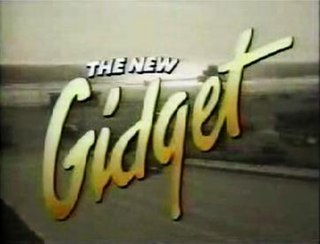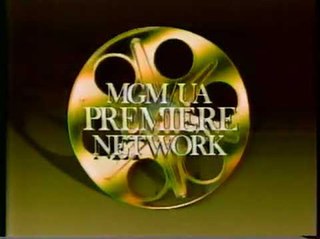
Brazil is a 1985 dystopian science-fiction black comedy film directed by Terry Gilliam and written by Gilliam, Charles McKeown, and Tom Stoppard. The film stars Jonathan Pryce and features Robert De Niro, Kim Greist, Michael Palin, Katherine Helmond, Bob Hoskins, and Ian Holm.

Universal Studios, Inc., later known as Vivendi Universal Entertainment, was an American media and entertainment conglomerate. As a result of the 2004 merger with NBC, it became NBCUniversal.

American Bandstand (AB) is an American music-performance and dance television program that aired regularly in various versions from 1952 to 1989. It was hosted from 1956 until its final season by Dick Clark, who also served as the program's producer. It featured teenagers dancing to Top 40 music introduced by Clark. The program was televised from Philadelphia from its 1952 debut until its move to Los Angeles in 1963
Lorimar Productions, Inc., later known as Lorimar Television and Lorimar Distribution, was an American production company that was later a subsidiary of Warner Bros., active from 1969 until 1993, when it was folded into Warner Bros. Television. It was founded by Irwin Molasky, Merv Adelson, and Lee Rich. The company's name was a portmanteau of the name of Adelson's then wife, Lori, and Palomar Airport.

Columbia Pictures Television, Inc. was launched on May 6, 1974, by Columbia Pictures as an American television production and distribution company. It is the second name of the Columbia Pictures' television division Screen Gems (SG) and the third name of Pioneer Telefilms. The company was active from 1974 until New Year's Day 2001, when it was folded into Columbia TriStar Television, a merger between Columbia Pictures Television and TriStar Television. A separate entity of CPT continues to exist on paper as an intellectual property holder, and under the moniker "CPT Holdings" to hold the copyright for the TV show The Young and the Restless, as well as old incarnations from the company's television library such as What's Happening!!

Universal Television LLC is an American television production company that is a subsidiary of Universal Studio Group, a division of NBCUniversal, which, in turn, is a wholly owned subsidiary of Comcast. It serves as the network television production arm of NBC; a predecessor of the company, NBC Studios, previously assumed such functions, and a substantial portion of the company's shows air on the network.

Imagine Entertainment, formerly Imagine Films Entertainment, also known simply as Imagine, is an American film and television production company founded in November 1985 by producer Brian Grazer and director Ron Howard.

Out of This World is an American fantasy sitcom about a teenage girl who is half alien, which gives her unique supernatural powers. It first aired in syndication from September 17, 1987 and ended on May 25, 1991.

ELP Communications was an American television production company that originally began in 1974.

The Munsters Today is an American sitcom and a revival of the original 1964–66 sitcom The Munsters that aired in syndication from October 8, 1988, to May 25, 1991.
NBCUniversal Syndication Studios, formerly known as NBCUniversal Television Distribution, Universal Domestic Television, Studios USA Television Distribution and MCA TV is the television syndication division of NBCUniversal, a division of Comcast, in the United States. Its predecessors include NBC Enterprises, Universal Television Distribution, Multimedia Entertainment, PolyGram Television, and Sky Vision. At some point in its history, it was also known as "NBCUniversal Television & New Media Distribution" and "NBC Universal Television and New Media Distribution.” This unit is possibly the parent for the similarly named "NBCUniversal Domestic Television Distribution" unit.
Sidney Jay Sheinberg was an American businessman, lawyer and entertainment executive. He served as president and CEO of MCA Inc. and Universal Studios for over 40 years.

The New Gidget is an American sitcom sequel to the original 1965–66 sitcom Gidget. It aired in syndication from September 15, 1986, to May 12, 1988. The series was produced by original Gidget series producer Harry Ackerman and was launched after the made-for-television film Gidget's Summer Reunion, starring Caryn Richman as Gidget, aired in 1985.

Action Pack, also called Universal Action Pack, was a syndicated programming block series of television movies and television series created by Universal Television that aired from 1994 until 2001. The Action Pack included two hours of various television series produced by Renaissance Pictures and distributed by MCA TV.

Marvel Action Universe was a 1988–1991 weekly syndicated television block from Marvel Productions featuring animated adaptions of Dino-Riders and RoboCop, along with reruns of the 1981 Spider-Man cartoon and Spider-Man and His Amazing Friends.

She's the Sheriff is an American television sitcom that aired in first-run syndication from September 19, 1987, to April 1, 1989. Produced by Lorimar Television, the series marked the return of Suzanne Somers to television for the first time since she left her role as Chrissy Snow on ABC's Three's Company in 1980.
Bustin' Loose is an American sitcom starring Jimmie Walker based on the 1981 film of the same name. The show ran in first-run syndication from September 19, 1987, to May 28, 1988.

The Premiere Network, or MGM/UA Premiere Network, was an ad hoc television network created by Metro-Goldwyn-Mayer/United Artists, which announced plans to launch in 1984, originally set for an October launch. By 1991, the name was shortened to simply the MGM Premiere Network.
You Can't Take It with You is an American sitcom television series produced for syndication in 1986. It was based on the 1938 film adaptation of the 1937 play by the same name.
MCA Inc. (originally an initialism for Music Corporation of America) was an American media conglomerate founded in 1924. Originally a talent agency with artists in the music business as clients, the company became a major force in the film industry, and later expanded into television production. MCA published music, booked acts, ran the MCA Records music label, represented film, television and radio stars, and eventually produced and sold television programs to the three major television networks, especially NBC.














